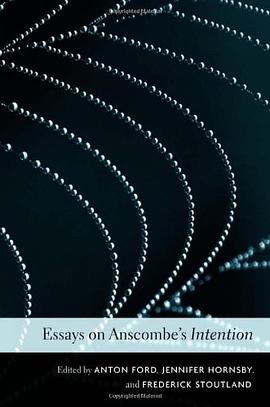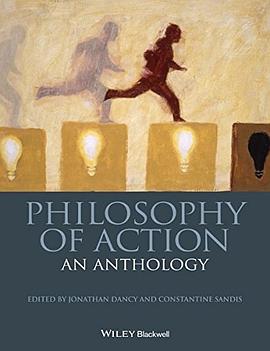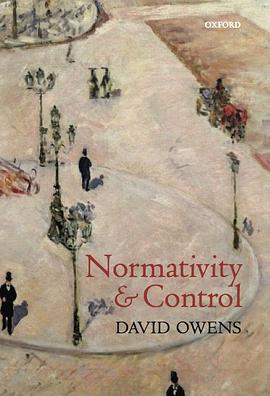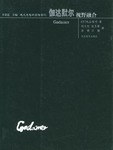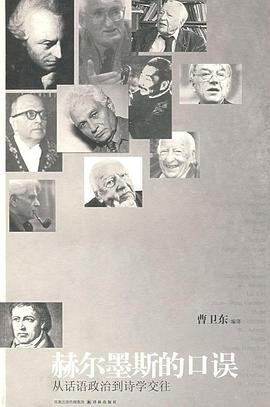
Anscombe's Intention pdf epub mobi txt 电子书 下载 2026
- 行动哲学
- 安斯康姆
- Anscombe
- Intention
- Philosophy
- Ethics
- Action
- FreeWill
- Mind
- Agency
- Intentions
- MoralPhilosophy

具体描述
Written against the background of her controversial opposition to the University of Oxford's awarding of an honorary degree to Harry S. Truman, Elizabeth Anscombe's Intention laid the groundwork she thought necessary for a proper ethical evaluation of actions like the bombing of Hiroshima and Nagasaki. The devoutly Catholic Anscombe thought that these actions made Truman a murderer, and thus unworthy of the university's honor-but that this verdict depended on an understanding of intentional action that had been widely rejected in contemporary moral philosophy. Intention was her attempt to work out that understanding and argue for its superiority over a conception of intention as an inner mental state.
Though recognized universally as one of the definitive works in analytic philosophy of action, Anscombe's book is often dismissed as unsystematic or obscure, and usually read through the lens of philosophical concerns very far from her own. Schwenkler's Guide offers a careful and critical presentation of Anscombe's main lines of argument at a level appropriate to advanced undergraduates but also capable of benefiting specialists in action theory, moral philosophy, and the history of analytic philosophy. Further, it situates Intention in a context that emphasizes Anscombe's debts to Aristotle, Aquinas, and Wittgenstein, and her engagement with the work of contemporaries like Gilbert Ryle and R.M. Hare, inviting new avenues of engagement with the ideas of historically important philosophers.
作者简介
John Schwenkler is Associate Professor of Philosophy at Florida State University, where he has taught since 2013. He specializes in the philosophy of mind, the philosophy of action, ethics, epistemology, and the philosophy of cognitive science.
目录信息
Abbreviations
Introduction: The Project of Intention
Interpretive Précis
Outline of the Text
The Commentary
1 Preliminaries
1.1 The three headings (§1)
1.2 Predictions and expressions of intention (§§2-3)
1.3 Action first (§§3-4)
1.4 Summary discussion
2 Beginnings of an Account
2.1 'Why?'-questions (§5)
2.2 The three epistemic conditions (§§6-8)
2.3 Reason, motive, and cause (§§9-16)
2.4 'For no reason' / 'I don't know why I did it' (§§17-18)
2.5 Summary discussion
3 The Unity of Action
3.1 An extra feature? (§19)
3.2 Further intention (§§20-21)
3.3 The A-D order (§§22-23, 26)
3.4 Intention and foresight (§§24-25, 27)
3.5 Summary discussion
4 Knowledge Without Observation
4.1 Raising difficulties (§28)
4.2 False avenues of escape (§§29-30)
4.3 Beginning to sketch a solution (§§31-32)
4.4 Summary discussion
5 Practical Reasoning
5.1 A difference in form (§33)
5.2 Calculation (§33-35)
5.3 The role of 'wanting' (§§35-36)
5.4 The guise of the good (§37-41)
5.5 '... an order which is there ...' (§§42-43)
5.6 Summary discussion
6 Practical Knowledge
6.1 The Thomistic background
6.2 'A form of description of events' (§§46-48)
6.3 The cause of what it understands (§§44-45, 48)
6.4 Doing without knowing?
6.5 Practical knowledge through perception?
6.6 Summary discussion
7 Concluding Discussion
7.1 Intentional and voluntary (§49)
7.2 Intention for the future (§§50-52)
Glossary of Terms
Bibliography
· · · · · · (收起)
读后感
评分
评分
评分
评分
用户评价
《Anscombe's Intention》这个书名,对我而言,不仅仅是一个标识,更是一种召唤。我是一名长期对人类行为逻辑和心智活动充满好奇的研究者,而“意图”恰恰是我反复思考、却又始终未能完全把握的核心概念。它像是一条隐藏在行为表象之下的河流,驱动着一切,却又难以被直接观测。我们经常会说“我这样做是有意图的”,但“意图”到底是什么?它与“无意识”、“习惯”、“巧合”之间又有着怎样的界限?这些问题在我脑海中盘旋已久,而当我在书架上看到这本书时,一种强烈的预感告诉我,它或许能为我提供解答。我期待这本书能够以一种系统而深入的方式,剖析“意图”的构成要素,揭示意图的形成机制,并探讨意图在人类社会互动和个人发展中所扮演的关键角色。我尤其关注的是,作者是否能够提供一种方法论,来帮助我们更清晰地辨识和理解自己以及他人的意图,从而更好地预测行为、化解冲突,甚至提升我们自我实现的效率。这本书的出现,在我看来,不仅仅是哲学领域的一项重要贡献,更是对我们理解自身存在和行动方式的一次深刻的启发,我迫不及待地想要踏入其中,去探索“意图”的奥秘。
评分当我第一次注意到《Anscombe's Intention》这本图书的名称时,一种难以抑制的好奇心便涌上心头。在繁杂的知识海洋中,如此直白且聚焦于一个核心概念的书名,本身就透露出一种深刻的哲学探究的决心。我一直对“意图”这个概念深感着迷,它是我们之所以能够有目的地行动、规划未来、实现目标的关键驱动力。然而,当我们试图去细致地审视“意图”本身时,它却又显得如此难以捉摸,仿佛是一个潜藏在行为背后的幽灵。它究竟是如何形成的?它与我们的愿望、信念、期待之间有着怎样的联系?它又如何在促使我们采取行动的过程中发挥作用?这些问题长期以来都让我感到困惑,而这本书名,仿佛是一把能够打开这扇神秘之门的钥匙。我无比期待能够通过阅读这本书,获得一种全新的理解框架,去深入剖析“意图”的本质,探寻它在人类心智活动中所扮演的关键角色。我希望这本书能够提供一些深刻的见解,或许能够帮助我更好地认识和理解自己行动的根源,以及如何更有效地将意图转化为成功的实践。
评分当我第一次看到《Anscombe's Intention》这个书名的时候,一种难以言喻的哲学冲动就被点燃了。我一直深信,人类之所以区别于机器和低等生物,关键在于我们拥有“意图”,一种能够超越即时刺激、设定长远目标并为之规划行动的能力。然而,这个概念本身却又极其微妙,它不像一张表格那样清晰明确,也不像一个物理定律那样可以被精确测量。它往往隐藏在我们的言谈举止之下,有时甚至连我们自己也未必能完全洞察。这本书的出现,对我来说,就像是一盏明灯,照亮了通往理解“意图”核心的道路。我极度渴望了解作者是如何解构这个复杂概念的,他们是否能够提供一种清晰的界定,区分真正的意图与仅仅是偶然的行为或冲动?我希望这本书能够深入到意图的心理根源,探讨它是如何在大脑中形成的,又如何在实践中引导我们的行动。更重要的是,我期待这本书能够为我们提供一种分析工具,让我们能够更准确地理解他人的意图,从而在人际交往、社会合作以及个人成长中做出更明智的决策。这本书的封面虽然朴实,但书名本身所蕴含的深度和力量,已经足以让我产生强烈的求知欲。
评分当我看到《Anscombe's Intention》这个书名时,一种对人类心智运作深层机制的好奇心被瞬间点燃。我一直觉得,我们之所以为“人”,很大程度上是因为我们能够拥有并执行“意图”。然而,“意图”这个概念,就像一个在水中摇曳的影子,既真实存在,又难以捉摸。它是什么?它是如何形成的?它与我们的行为又有着怎样的必然联系?这些问题在我多年的思考和观察中始终萦绕不去。通常,我们习惯于将意图看作是行动的驱动力,但究竟是什么驱动了意图本身?它是否总是显而易见的,还是常常隐藏在潜意识的深处?我期待这本书能够提供一种清晰的视角,帮助我理解意图的本质,或许能够为我揭示出意图与行动之间那种复杂而又至关重要的联系。我希望它不仅仅是理论上的推演,更能通过深入的分析和例证,让我对“意图”这一概念有一个更深刻、更具体的认识,从而能够更好地理解自己以及他人的行为模式,甚至能够启发我如何更有效地规划和实现自己的目标。这本书的出现,对我来说,就像是为我打开了一扇通往理解人类主体性核心的大门。
评分《Anscombe's Intention》这个书名,本身就承载着一种哲学的重量和一种对人类认知核心的探求。我一直对“意图”这个概念非常感兴趣,因为它似乎是我们之所以能够做出有目的、有计划的行为的关键。但仔细想来,意图究竟是什么?它仅仅是我们大脑中的一个念头,还是有更深层的含义?它如何影响我们的行为,又如何与我们的信念和欲望联系在一起?这些问题长期以来都让我感到着迷,但又常常难以找到清晰的答案。我希望这本书能够提供一个深入的分析,帮助我理解意图的本质,以及它是如何在我们的日常生活中发挥作用的。我期待作者能够提供一些新的视角,或许能够帮助我们区分有意识的意图和无意识的行为,或者揭示出意图的形成过程中有哪些关键因素。更重要的是,我希望这本书能够启发我更清晰地认识到,我们是如何通过意图来塑造自己的生活,以及我们与周围世界的关系。这本书的出现,对我而言,不仅仅是阅读一本哲学著作,更是一次对自己思维方式和行动逻辑的深刻审视。
评分《Anscombe's Intention》这个书名,对我而言,自带一种沉甸甸的学术分量。我一直认为,在人类所有的心智活动中,“意图”是最具决定性也最具魅力的一个。它不仅仅是我们行动的起点,更是我们自我认知和社会身份构建的基石。然而,这个概念的分析却异常困难。我们如何才能确切地知道一个人是否有意图?意图是如何从一系列复杂的心理过程——比如欲望、信念、期待——中涌现出来的?它与行为之间的关系又是怎样的?这些问题长期以来困扰着许多哲学家,也深深地吸引着我。我一直对那些能够清晰梳理复杂概念,并提供深刻见解的著作怀有极高的敬意,而《Anscombe's Intention》的书名,恰恰传递了这样的信息。我迫切地希望通过阅读这本书,能够获得一种新的理解框架,去洞察意图在人类行为中所扮演的真正角色。我期待作者能够提供一些突破性的论点,或许能够重新定义我们对意图的传统认知,让我们能够更清晰地认识到,我们是如何通过意图来塑造自己的生活,以及我们与周围世界的联系。这本书不仅仅是关于哲学概念的探讨,更是关于人类能动性和自我决定的深刻反思。
评分《Anscombe's Intention》这个书名,在我看来,直击了人类心智活动的“核心区”。我一直对“意图”这个概念着迷,它似乎是我们之所以区别于自然现象和机器的关键所在——我们有目的,有方向,有规划。然而,当我们试图去定义它,去量化它,去解释它时,它又变得如此 elusive。它究竟是源于理性思考,还是某种深层欲望的驱动?它是如何从一闪而过的念头,转变为坚定的行动指南的?这些问题,常常在我的思考中占据重要的位置。我非常期待这本书能够提供一个全新的视角,帮助我解构“意图”这个概念,或许能够提供一种清晰的方法,来识别和理解我们自身以及他人的意图。我希望作者能够深入挖掘意图的心理学基础,探讨它在认知过程中的地位,以及它如何影响我们对世界的感知和对自身行为的理解。读到这本书,对我而言,不仅仅是获取知识,更是一次对“自我”和“行动”之间关系的深刻反思,我希望它能带来一些颠覆性的见解,让我对“我”的行动逻辑有一个全新的认识。
评分这本《Anscombe's Intention》的书名本身就带着一种难以言喻的吸引力,仿佛直接点明了核心,又仿佛将读者引向了一个深邃的哲学迷宫。我第一次注意到它,是在一个关于行动哲学的学术论坛上,它被反复提及,成为讨论的焦点,但讨论的内容本身却晦涩难懂,让我更加好奇这本书究竟能提供怎样的视角。当我终于拿到这本书时,它的装帧简洁而富有质感,触手可及的纸张散发着淡淡的书墨香,这本身就构成了一种期待。我迫不及待地翻开它,想要探寻作者是如何解构“意图”这一人类最基本、却又最难以捉摸的概念的。我一直觉得,我们之所以区别于其他生物,很大程度上就在于我们拥有复杂的意图,我们并非仅仅被本能驱动,而是能够有意识地设定目标,规划路径,并付诸行动。然而,当我们深入探究“意图”本身时,却会发现它像一个幽灵,总是游离在我们的理性之外,既是行动的源头,又难以被清晰地定义和捕捉。这本书的书名,就像一把钥匙,或许能为我们打开这扇尘封已久的门,让我们窥见意图的本质,理解我们为何如此行动,以及意图在我们的认知和行为中扮演着怎样的角色。这不仅仅是对一个哲学概念的探讨,更是对人类自身本质的一次深刻审视,因此,我对它抱有极高的期待,希望它能够带来颠覆性的思考,让我对“我”和“我的行动”有一个全新的认识。
评分拿到《Anscombe's Intention》这本书,我首先被它那种直指核心的书名所吸引。在当下的知识碎片化时代,很少有书籍能如此大胆而直接地宣告其研究的对象。通常,我们会看到一些模糊、宽泛的书名,以期吸引更广泛的读者,但这本书却反其道而行之,仿佛在说:“我就在这里,我就是要探讨‘意图’。”这种毫不回避的态度,本身就传递了一种自信和勇气,也让我对书中内容的严谨性和深度产生了浓厚的兴趣。我一直对“意图”这个概念深感着迷,它是连接思想与行动的桥梁,是我们之所以能够规划未来、实现目标的关键。然而,意图的运作机制却异常复杂,它涉及到意识、欲望、信念,以及对未来的预测,这些因素相互交织,使得意图的分析成为一个棘手的哲学问题。我曾经阅读过一些关于意志自由和决定论的著作,它们都不可避免地触及到意图的问题,但往往只是将其作为一个前提,而非深入剖析。因此,我非常期待《Anscombe's Intention》能够提供一个全新的、更具穿透力的视角,帮助我理解意图是如何形成的,又是如何在我们的行为中发挥作用的。我希望这本书不仅仅停留在理论层面,更能提供一些具体的分析和案例,让“意图”这个抽象的概念变得生动和具体,从而引发我对自己日常行为的深刻反思。
评分当我初次接触到《Anscombe's Intention》这个书名时,一种强烈的求知欲便油然而生。我一直对人类行为的内在机制感到好奇,而“意图”无疑是其中最核心、也最难以捉摸的部分。我们每天都在做出各种决定,执行各种行动,而这一切的背后,似乎都离不开“意图”的指引。但“意图”到底是什么?它仅仅是一个简单的想法,还是一个更为复杂的心理结构?它如何从我们的意识中产生,又如何转化为实际的行动?这些问题在我心中反复浮现,而这本书名,仿佛直接点出了我所追寻的答案。我非常期待这本书能够提供一个深入的、系统的分析,帮助我理解意图的本质,以及它在我们生命中所扮演的关键角色。我希望作者能够以一种清晰而富有洞察力的方式,揭示出意图的构成要素,以及它与我们的行为、信念、欲望之间复杂的互动关系。读完这本书,我希望能对“为什么我会这么做”有一个更深刻的理解,并能够更有效地规划和实现自己的目标。这本书的出现,对我来说,不仅是对一个哲学概念的探索,更是对理解人类主体性和能动性的重要一步。
评分 评分 评分 评分 评分相关图书
本站所有内容均为互联网搜索引擎提供的公开搜索信息,本站不存储任何数据与内容,任何内容与数据均与本站无关,如有需要请联系相关搜索引擎包括但不限于百度,google,bing,sogou 等
© 2026 book.wenda123.org All Rights Reserved. 图书目录大全 版权所有

